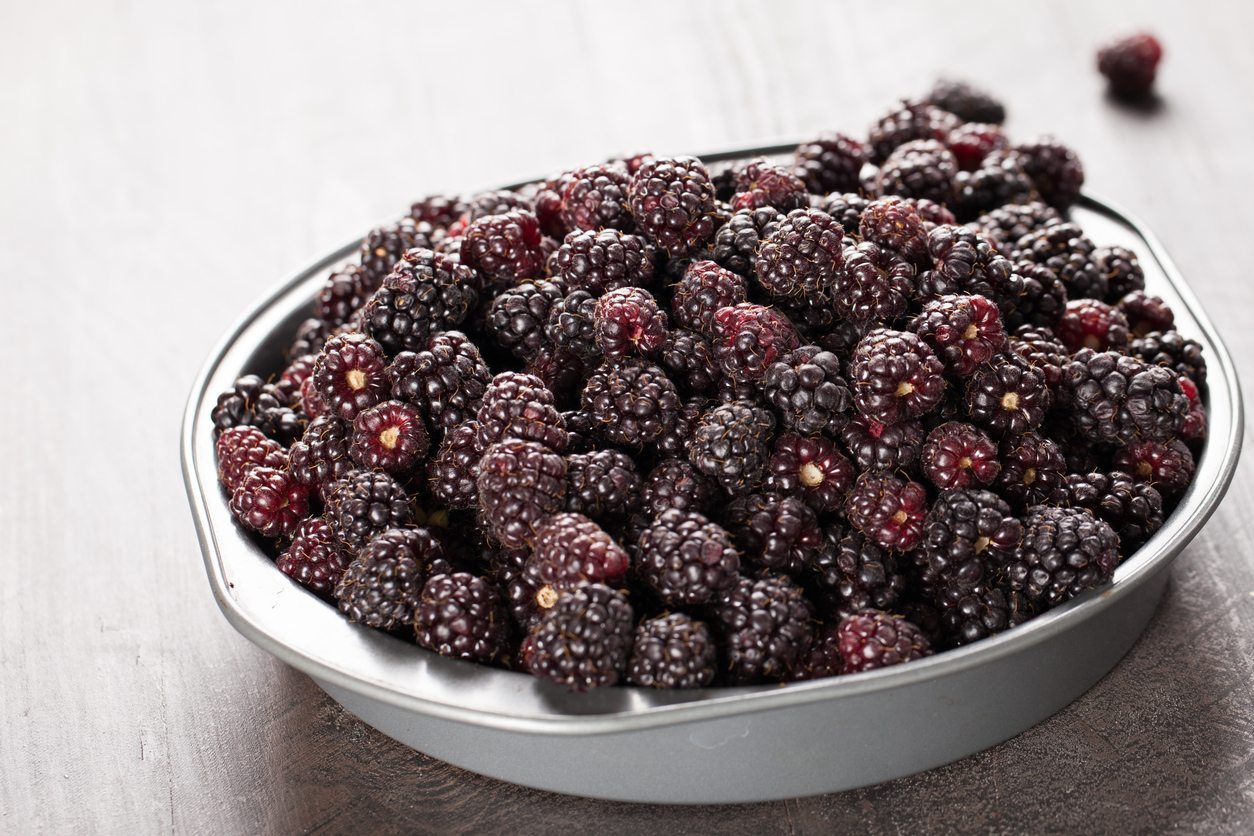6. Boysenberries:

These are deep maroon-colored, glossy, large, juicy berries that are a cross between raspberries, blackberries, and loganberries. They are used as pie fillings and to decorate cheesecakes and tarts.
Healthy berry option is the boysenberry. This lesser known berry has some intriguing health properties that are just starting to be appreciated by the general public.
The purple-blue berry known as the boysenberry is actually a cross between a Pacific blackberry and a raspberry. These berries with their slightly tangy taste can be enjoyed fresh by the handful or made into jams, jellies, syrups, sauces, and pie fillings. They add a touch of sweet tartness to dessert offerings, yogurt, and smoothies.
Health benefits of boysenberries
Like the blueberry, boysenberries are a rich source of anthocyanins, natural antioxidants which help to maintain healthy brain cells and protect against oxidative damage that leads to brain aging and Alzheimer’s disease. They also appear to play a role in boosting memory. The anthocyanins have already been shown to prevent oxidative damage in the test tube, and it’s hoped this will be confirmed in animal and human models.
These aren’t the only health benefits of boysenberries. Boysenberry anthocyanins appear to have anti-inflammatory and cancer inhibitory properties in preliminary studies, and may be particularly effective against tumors of the colon and esophagus. The boysenberry, along with other deeply colored berries, are excellent food sources of cell protective anthocyanins, making them an important part of any diet.
Anthrocyanins: Anthrocyanins are natural antioxidants that protect against brain aging through the maintenance of healthy brain cells. This leads to increased protection against degenerative brain disorders like Alzheimer’s disease. Boysenberries have a high concentration of anthrocyanins, and they can be eaten to boost memory no matter what your age. Anthrocyanins can also work to prevent inflammation and cancer.
Vitamin C: Boysenberries are high in vitamin C, which may be one of the most useful nutrients that humans need to consume. Vitamin C increases the protection offered by the immune system, and it can also prevent cardiovascular disease and prenatal health issues. It has also been shown to help prevent and alleviate eye disease and to improve health overall.

Vitamin K: Vitamin K is a vitamin that is found in high concentrations in boysenberries. This vitamin is known to decrease the risk of thickened arteries and osteoporosis. It has also been shown to reduce the risk of Alzheimer’s disease and of kidney stones. Vitamin K is an essential vitamin for the maintenance of health, and it has even been shown to have a positive effect on preventing diabetes.
Dietary Fiber: Boysenberries contain a high amount of fiber, and daily consumption of fiber is important for a health body. Dietary fiber will help prevent heart disease and cancer, and it can lessen the chance of developing diabetes. It has also been known to prevent the formation of gallstones and kidney stones. Fiber also aids in digestion and can reduce or even eliminate many digestive issues, including diarrhea and constipation Nutritional content of boysenberries Boysenberries are a fat-free fruit treat that’s also low in calories. At only sixty-six calories per cup, they’re a guilt-free snack or dessert. A one cup serving has seven grams of soluble fiber which helps to lower cholesterol and maintain heart health. They also provide almost a third of the daily recommended amount of folate, a form of B vitamin that’s particularly important during pregnancy to prevent neural tube defects in the unborn baby.
With these wonderful health benefits, you’ll want to keep your eyes open for these luscious berries. Unfortunately, it can be a challenge to find them in some grocery stores. Some markets stock them in cans or in packages in the frozen food section. One of the best places to find these berries is at a local farmer’s market. When you find them, be sure to stock up since they can be frozen for later use. You can also dry them in a dehydrator to add to trail mix or homemade granola bars.
Disclaimer
The Content is not intended to be a substitute for professional medical advice, diagnosis, or treatment. Always seek the advice of your physician or other qualified health provider with any questions you may have regarding a medical condition.